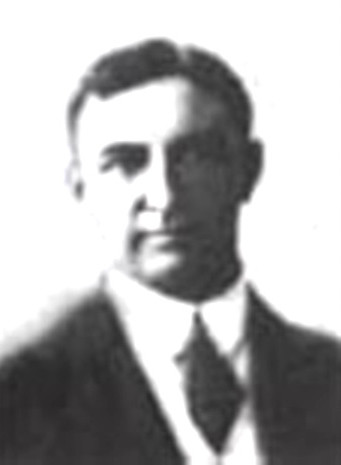Stan Rowley
| athletics | ||
| gold | 1900 | 5000 m team |
| bronze | 1900 | 60 m |
| bronze | 1900 | 100 m |
| bronze | 1900 | 200 m |
Stan Rowley (actually: Stanley Rupert Rowley ; born September 11, 1876 in Young , New South Wales , † April 1, 1924 in Manly , New South Wales) was an Australian athlete and participant in the Olympic Games .
At the Olympic Games in Paris in 1900 , he started for Australia in three sprint disciplines and finished third in each case. In the 60-meter run behind the two Americans Alvin Kraenzlein and Walter Tewksbury , in the 100-meter run behind the two Americans Frank Jarvis and again Tewksbury and in the 200-meter run behind Tewksbury and Norman Pritchard from India. Rowley was able to win the 200 meter run against Tewksbury, but he was clearly behind in the final.
Rowley was a pure sprinter , so his participation in the 5,000-meter team race was all the more astonishing. The team run was not intended as a national competition, but rather for club or association teams. In the final, the British athletics federation Amateur Athletic Association (AAA) competed against the French athletics club Racing Club de France (RCF) . They were the only teams registered.
A team consisted of five athletes. The AAA included four British runners as well as the Australian Rowley. As a member of the British Empire , he was eligible to start for the AAA . Rowley was actually unsuitable for the 5000 meters , but there was no other runner eligible for the AAA available in Paris. His start only had the purpose to complete the team, because from the beginning it was expected that he would come in last. So Rowley took it slow, and when the penultimate, Frenchman Michel Champoudry, crossed the finish line, Rowley had only covered 3,500 m. The jury then decided that Rowley did not have to end his race.
The ranking was based on the number of places (1st place = 1 point; 2nd place = 2 points etc.). The team with the lowest number of places (points) was the winner. With places 1, 2, 6 and 7 of the other runners, the AAA team was sure of victory.
Rowley thus managed the curiosity of becoming Olympic champion in a discipline that was completely unsuitable for him , while he had to be content with third place three times in his special disciplines.
Placements at the Olympic Games:
- II. Olympic Games 1900, Paris
- 5000 m team - gold in the mixed team (silver to France )
- 60 m - bronze with 7.1 s (gold to Alvin Kraenzlein , USA with 7.0 s; silver to Walter Tewksbury from the USA with 7.0 s)
- 100 m - bronze with 11.2 s (gold to Frank Jarvis from the USA with 11.0 s; silver to Walter Tewksbury from the USA with 11.1 s)
- 200 m - bronze with 22.9 s (gold to Walter Tewksbury from the USA with 22.2 s; silver to Norman Pritchard from India with 22.8 s)
Note: With the exception of the time of the winner, the running times are estimated as there was no time measurement for those placed. With them, the gap to the winner or the first place was determined with a length specification.
Teams with athletes of different nationalities were classified as mixed teams by the International Olympic Committee (IOC) . Rowley's victory with the AAA team has no impact on the statistics of Australian Olympic history.
Rowley was one of the world's best sprinters of the late 19th century. At the Championships of Australasia in 1897 and 1899 he was able to win the title over 100 and 220 yards respectively. At the national Australian championships in 1898 and 1900 he also won a victory in these two disciplines.
Web links
- Stan Rowley in the database of Athletics Australia (English)
- Stan Rowley in the Sports-Reference database (English; archived from the original )
| personal data | |
|---|---|
| SURNAME | Rowley, Stan |
| ALTERNATIVE NAMES | Rowley, Stanley Rupert (full name) |
| BRIEF DESCRIPTION | Australian athlete |
| DATE OF BIRTH | September 11, 1876 |
| PLACE OF BIRTH | Young (New South Wales) |
| DATE OF DEATH | April 1, 1924 |
| Place of death | Manly |
